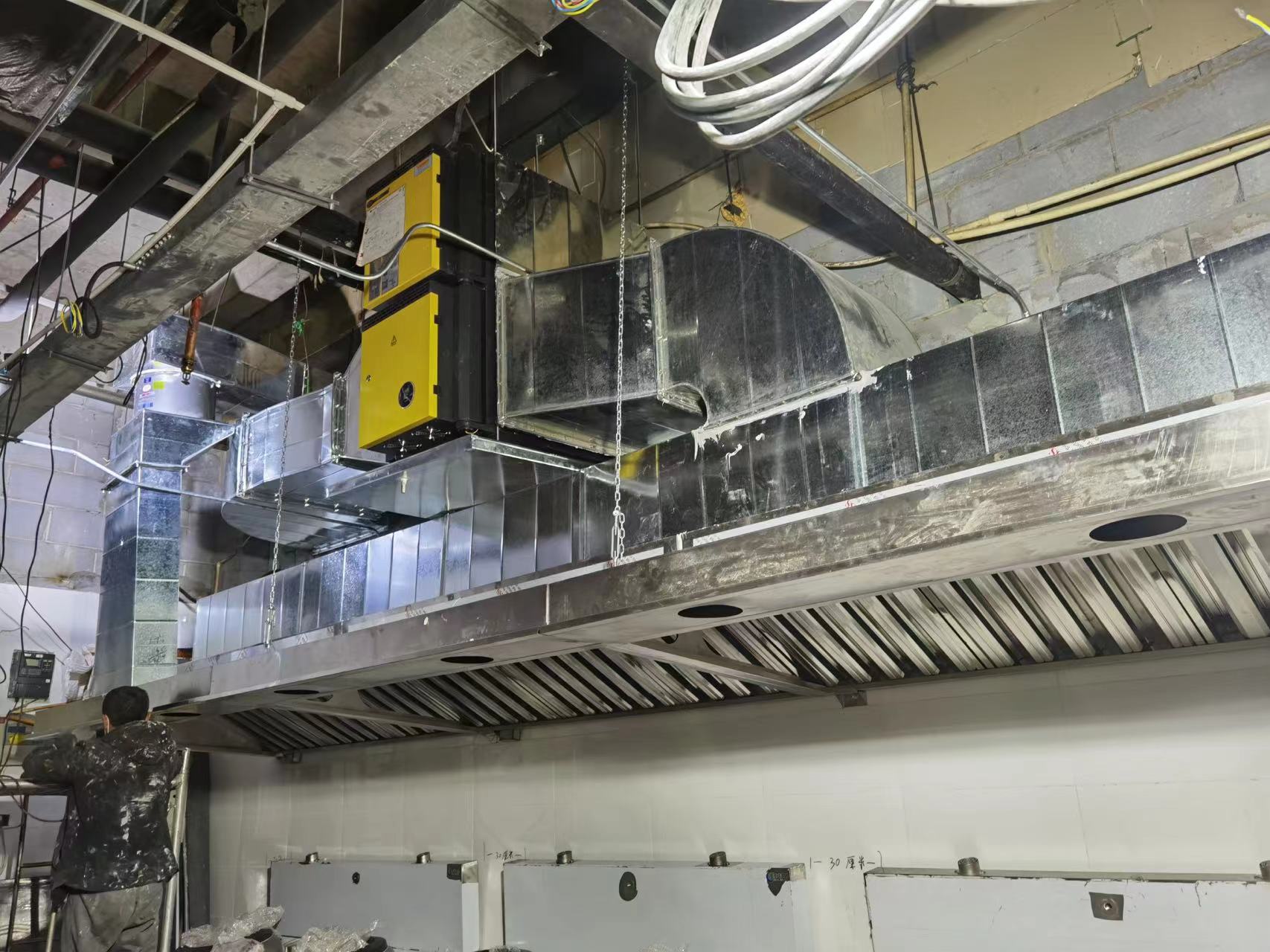1.廚房及設(shè)備獨(dú)立設(shè)置,每個商鋪廚房獨(dú)立設(shè)置一套排油煙設(shè)備。這種方式能夠保證各個廚房相互獨(dú)立,杜絕了串味的現(xiàn)象,是使用效果更好的排油煙方式,但是該方式需要較多的管井,占用大量的建筑面積及吊頂空間,如后期業(yè)態(tài)調(diào)整,增加餐飲店鋪時,需另行增加豎井,改造難度及成本較高。
1. The kitchen and equipment shall be set independently, and each shop kitchen shall be set with a set of lampblack exhaust equipment independently. This way can ensure that each kitchen is independent of each other, and eliminate the smell. It is the best way to use lampblack. However, this way requires more tube wells, and takes up a lot of building area and ceiling space. If the business type is adjusted in the later stage, when adding catering stores, additional vertical shafts are needed, which is difficult and costly to transform.
2.獨(dú)立設(shè)置廚房凈化設(shè)備,煙道井集中排放。對于多個面積較小的商戶,可以采用這種形式,設(shè)置獨(dú)立總排放豎井,每層設(shè)置排油煙總管,商戶廚房內(nèi)的油煙經(jīng)過凈化設(shè)備及風(fēng)機(jī),通過總管排入豎井集中排放。這種方式占用建筑面積相對較少,由于需集中排放,距離豎井較遠(yuǎn)的商鋪排油煙橫管較長,各個商戶自行安裝風(fēng)機(jī)的風(fēng)量和風(fēng)壓難以完全管控,運(yùn)行時段風(fēng)量平衡難以較難控制,樓層主風(fēng)管和豎井內(nèi)處于正壓區(qū),存在“串味”的風(fēng)險,影響整個項目的室內(nèi)空氣品質(zhì)。
2. The kitchen purification equipment shall be set independently, and the flue shaft shall be discharged in a centralized manner. For several merchants with small area, this form can be used to set up an independent total discharge shaft, and each floor is set with a main oil smoke exhaust pipe. The oil smoke in the merchant kitchen is discharged into the shaft through the main pipe through purification equipment and fans. This method takes up relatively small building area. Due to the need for centralized emission, the horizontal pipe of lampblack exhaust in shops far away from the shaft is long. It is difficult to fully control the air volume and air pressure of the fans installed by each merchant, and it is difficult to control the air volume balance during the operation period. The main air duct of the floor and the shaft are in the positive pressure zone, which has the risk of "smell", affecting the indoor air quality of the entire project.
3.在第二種方式的基礎(chǔ)上,分區(qū)域設(shè)置排油煙豎井,在煙道井頂部設(shè)置集中排油煙風(fēng)機(jī)和二次凈化設(shè)備,保證足夠的風(fēng)量和風(fēng)壓,同時給后期增加餐飲業(yè)態(tài)預(yù)留余量。這種方式豎井和樓層風(fēng)管在屋頂風(fēng)機(jī)的作用下均可保持負(fù)壓, “串味”的風(fēng)險很小,但這種方式的問題在于屋頂風(fēng)機(jī)的風(fēng)量較大、耗電量高、風(fēng)機(jī)噪音大、并且各個商戶風(fēng)量平衡難以調(diào)節(jié),計量難度較大。
3. On the basis of the second method, lampblack exhaust shafts shall be set up in different areas, and centralized lampblack exhaust fans and secondary purification equipment shall be set up at the top of the flue shaft to ensure sufficient air volume and air pressure, and reserve allowance for the later increase of catering business. In this way, the vertical shaft and floor air duct can maintain negative pressure under the action of the roof fan, and the risk of "odor" is very small. However, the problem of this way is that the wind volume of the roof fan is large, the power consumption is high, the fan noise is large, and it is difficult to adjust the air volume balance of each merchant, which makes it difficult to measure.

綜上,對于商業(yè)項目較小,餐飲店鋪布置分散,排油煙量不大的情況下方案一,因排油煙風(fēng)量不大,一級凈化已足夠?qū)⒂蜔焹艋蓛簦赇伔稚⒁矡o需設(shè)置獨(dú)立豎井,對于商業(yè)項目較大,樓層較多,餐飲排油煙風(fēng)量大,采用方案三,大型商業(yè)后期調(diào)改可能較大,分區(qū)域設(shè)置豎井方便后期調(diào)改,屋頂二級凈化保證凈化效率及管井內(nèi)負(fù)壓,保證在即使在風(fēng)管存在漏風(fēng)情況下,也不油煙味道竄建筑其它區(qū)域,保證建筑空氣品質(zhì)。
To sum up, Scheme I is recommended when the commercial projects are small, the catering stores are scattered, and the amount of lampblack is not large. Because the amount of lampblack is not large, the primary purification is enough to clean the lampblack, and there is no need to set up independent shafts when the stores are scattered. Scheme III is recommended when the commercial projects are large, the floors are large, and the amount of lampblack from catering is large. Large commercial projects may have a large amount of lampblack in the later period, and the setting of shafts in different regions is convenient for the later period, The secondary purification of the roof ensures the purification efficiency and the negative pressure in the tube well. It ensures that even in the case of air leakage in the air duct, the smell of lampblack will not escape to other areas of the building, so as to ensure the air quality of the building.
2排油煙系統(tǒng)風(fēng)量的確定
2. Determination of air volume of lampblack exhaust system
1、計算法廚房通風(fēng)應(yīng)該按照排 風(fēng)的排風(fēng)量和灶頭局部排風(fēng)的排風(fēng)量兩部分風(fēng)量來確定,其中廚房通風(fēng)量應(yīng)按照室內(nèi)余熱按照熱風(fēng)平衡來確定:
1. Calculation method The kitchen ventilation shall be determined according to the exhaust air volume of the overall exhaust and the exhaust air volume of the local exhaust of the stove. The overall ventilation volume of the kitchen shall be determined according to the elimination of indoor waste heat and the hot air balance:
灶頭排風(fēng)量應(yīng)按照以下公式計算:
The exhaust air volume of the stove shall be calculated according to the following formula:
廚房總的排風(fēng)量即為通風(fēng)量與灶頭通風(fēng)量之和。
The total exhaust air volume of the kitchen is the sum of the overall ventilation volume and the stove ventilation volume.
2、換氣次數(shù)法當(dāng)設(shè)計前期廚房沒有進(jìn)行計算的條件時,按照《民用建筑暖通空調(diào)設(shè)計技術(shù)措施》中的相關(guān)規(guī)定,廚房排油煙可按換氣次數(shù)法確定風(fēng)量:中餐廚房40-60次/h,西餐廚房30-40次/h,職工餐廳廚房25-25次/h。在暖通設(shè)計初始階段,餐飲業(yè)態(tài)定位及餐飲鋪廚房規(guī)劃并不確定,前期一般按照換氣次數(shù)法選擇設(shè)備及預(yù)留管道,上述換氣次數(shù)對于大、中型餐飲廚房較為合適,但如果店鋪面積較小,換氣次數(shù)法確定的風(fēng)量與實(shí)際需要風(fēng)量誤差較大,一般設(shè)定更小風(fēng)量不小于3000m3/h。
2. Ventilation rate method When there is no condition for calculation in the kitchen at the early stage of design, according to the relevant provisions in the Technical Measures for HVAC Design of Civil Buildings, the air volume of kitchen lampblack can be determined according to the ventilation rate method: 40-60 times/h for Chinese kitchen, 30-40 times/h for Western kitchen, 25-25 times/h for staff dining hall kitchen. At the initial stage of HVAC design, the positioning of catering industry and the planning of catering shop kitchen are uncertain. In the early stage, equipment and reserved pipes are generally selected according to the air exchange rate method. The above air exchange rate is more appropriate for large and medium-sized catering kitchens. However, if the store area is small, the air volume determined by the air exchange rate method has a large error with the actual required air volume. Generally, the minimum air volume is not less than 3000 m3/h.
上一篇:酒店及餐飲廚房排煙常見的處理方法
下一篇:餐飲店必須安裝油煙凈化器是為什么?



